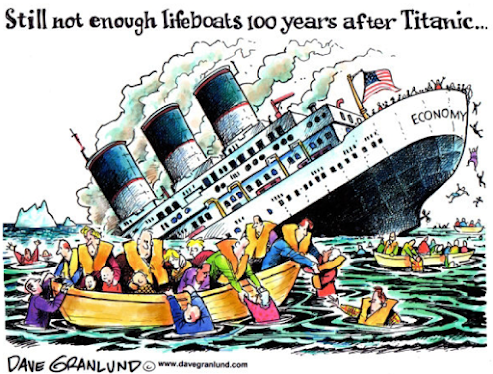“In the early days of this blog I published what I thought was a throwaway post, entitled “88 Important Truths I’ve Learned About Life”. It was nothing but 88 sweeping aphorisms I had collected as they occurred to me, delivered with a bit of snark. But it was a huge hit and still brings new people to Raptitude. Today I can’t bear to look at it. It’s just too preachy. But I understand the appeal. It’s fun to throw down an aphorism, and ask yourself if you really believe it. Here’s what I’ve learned (I think) in the seven years since. Also quite preachy.
1. Growth means doing things that are hard for you right now. There’s no other way.
2. The news doesn’t show you how the world is. It shows you whatever will make you watch more news.
3. Metal tools and utensils cost a lot more, but last about twenty times as long as plastic ones.
4. Good listeners are rare. When you find one, keep them in your life. And pay it forward.
5. Nobody sees you the way you see yourself, which should probably come as a relief.
6. Often nobody wants to make decisions for the group. Everyone appreciates the person willing to propose a time or a place.
7. Every generation thinks the one that came before them and the one that came after them are the worst.
8. For whatever reason, everywhere in the world human beings are willing to spend enormous amounts of money and time on alcohol.
9. Almost all casual photos would be improved simply by getting closer. You don’t need to get people’s entire bodies in the frame.
10. You don’t really know someone until you know what they struggle with most.
11. Not long ago, tea, sugar and spices were really hard for ordinary people to get. But they’re still as delicious as they always were. So enjoy!
12. If you spend a week tracking how you actually spend your waking hours, you will probably be shocked.
13. Friendships take work to maintain, and it’s possible the other person is doing all the work.
14. One way to add hours to your week, and months to your life, is to put your phone somewhere beyond arm’s reach.
15. Often, to make a breakthrough with something, you just need to stick with it a little longer than you usually do. Even five or ten minutes.
16. You can shave a decade or two off your working life by understanding compound interest and the long-term value of your purchases.
17. It’s almost impossible to convince someone of something once they see you as being on the “other side”.
18. Losing weight really is as simple as reducing the number of calories you eat. Not easy, but very simple.
19. Often we convince ourselves that we have less freedom than we really do, so that we don’t have to be responsible for doing the right thing.
20. Listening to the blues really does help when you have the blues.
21. I said this last time, but as a reminder: it’s worth retrying foods you didn’t like the first time.
22. We all have unconscious biases, even nasty ones about race, class and sex. Don’t believe anyone who says they don’t have any.
23. We are all thinking and ruminating nearly all day long, which is why we constantly seek activities that can relieve us from it, like music, TV, drinking, sex and death sports.
24. Romantic love might be a pretty recent invention, so don’t get too bent out of shape if your experience doesn’t fit the mold.
25. When you quit smoking you immediately realize how bad you stank all those years.
26. Daily meditation has a way of making solutions to many of your problems suddenly obvious.
27. “Comfort zone” is an annoying term but it sure is useful. It’s the only place to find solutions to your longest-running problems.
28. Everything has more detail to be found, if you take some time to look even closer. Especially plants.
29. The main reason we argue online is because it feels good, but we like to imagine it’s also somehow noble or helpful.
30. “Act the way you want to feel” actually works a lot of the time.
31. One thing nobody regrets is becoming a fit, active person.
32. Our beliefs about right and wrong come from mostly from intuitions and gut feelings, not logic.
33. We evolved to go days without food. Missing a meal shouldn’t be a big deal, but if you skip the odd lunch people will assume you have an eating disorder.
34. New York City is a pretty neat place. Don’t die without visiting, if possible.
35. Pretty much all double albums would have been better as single albums. Except maybe The Wall.
36. Propaganda’s effects can last forever. Two hundred years later, most people still think Marie Antoinette said “Let them eat cake”.
37. It’s really liberating, after trying to look smart for so many years, to start freely admitting when you’re wrong and when you don’t know what the hell you’re talking about.
38. Every household should have an aloe plant. Don’t wait until you burn yourself to go get one.
39. We’re all going to die, and on the whole that is definitely a good thing. Wouldn’t it be terrible if all of this never ended? It would also get very crowded.
40. John Waters was on to something when he said, “If you go home with someone, and they don’t have any books, don’t f**k them.”
41. Voting is only one of many avenues individuals have for shaping the direction of society, and it’s an extremely low-leverage one.
42. The ability to make good art depends a lot on your willingness to make lots of bad art in between.
43. We tend to think more about negative events than positive ones. Knowing that is helpful, in case you think there’s something wrong with you.
44. A decent definition for self-love is “Doing for yourself what you would want your kids to do for themselves.”
45. Not making your bed in the morning sets the bar kind of low for the rest of the day.
46. Having a defensible opinion, on any topic at all, actually requires a ton of work. Mostly reading.
47. Everything you own has an effect on your psyche. Less stuff makes for a less disturbed mind in general.
48. Bachelors, if you want to class your place up a bit, a few plants goes a long way.
49. We are all atheists, in a sense. Every person denies the existence of either most or all of the gods that have been proposed.
50. The most insightful news source in America is
The Onion.
51. Meeting and/or staying with locals completely changes the travel experience.
52. The best and worst thing about life is all the other people. Well, mostly.
53. Becoming exceptional at something is probably just a matter of making #15 your normal way of doing things.
54. Going for a walk almost always alters the mood, at least a little.
55. One quality everyone finds attractive is competence, at anything really. Experts are super sexy.
56. We would probably be more moral creatures if we acknowledged how difficult fairness and compassion actually is for members of our species.
57. Lasting habit changes always involve some kind of identity shift. Running every day stops being a grind only once you begin to feel like a runner.
58. To pass easily through crowded sidewalks, stare just above everyone’s hairline and keep your speed up. They will get out of the way.
59. Not hiding it when you’re wrong commands more respect than always appearing to be right.
60. We are all selfish, to a pretty alarming degree. If you’ve ever bought a cocktail, you bought it instead of eyeglasses or medicine for some poor kid somewhere.
61. Whoever invented the zipper was a goddamn genius.
62. When a party has degenerated into people showing each other their favorite YouTube videos, it’s time to call a cab.
63. Future societies will laugh at us for how we let advertising cover nearly every available public space.
64. Other people, generally, can see solutions to your problems more clearly than you can. (Use this to your advantage.)
65. Fears get stronger whenever you heed them, and weaker whenever you act in spite of them. This is a simple law you can depend on.
66. Most of the difficulty and awkwardness associated with a task is stacked right at the beginning, so it’s over with quickly unless you chicken out really early on.
67. Listening attentively to someone’s problem without trying to solve it is a skill that’s greatly appreciated, and is worth practicing.
68. Humans are too complex for everything in their lives to run smoothly at once; it’s probably normal to be a mess in at least a few areas.
69. Lots of people you know are hiding addictions, and you’d never guess who.
70. There will always be enough suffering in the world to horrify you a million times over, so it may not be worth dwelling on at times when you’re not doing anything about it.
71. There’s a kind of low-brow pleasure we get from being angry and indignant, and very often there’s nothing else we gain from it.
72. Most classic novels are very readable, but we think of them as dry and awful because of the ones forced on us in high school.
73. There is a paradoxical relationship between ease and difficulty; sticking to easy things makes life hard, while doing hard things makes life easy.
74. Posture has a predictable and immediate effect on mood.
75. Goals have to improve your life in the short-term in order for you to keep at it all the way to the long-term rewards.
76. It can be really freeing to see a given present moment as though it’s the beginning of your life. In a sense, it is.
77. People usually like it when you ask them for advice in their areas of expertise. Also, #64 makes this a smart thing to do.
78. How free you feel in day-to-day life depends a lot on your willingness to open up to discomfort when it happens. That can be practiced.
79. There’s no need to eat iceberg lettuce in a world with available romaine, baby spinach, arugula and endive. Branch out!
80. By the time voices are raised, communication has stopped.
81. A few fancy, high-quality grocery purchases are still way cheaper than even a crappy restaurant experience, and there will be leftovers.
82. People that lie to others in your presence would probably lie to you just as easily.
83. We overvalue pithiness because it’s immediately gratifying, and we undervalue nuance because it takes too much work. But you should share this post anyway.
84. Keeping secrets is really hard for almost everyone. The secret-keeper eventually confides in one other person, thinking they won’t do the same thing.
85. We tend to think the person we are is the person we’ve been so far.
86. Self-doubt is hard to deal with but it does keep our standards high. The worst art is made by people who think everything they do is great.
87. We always think that our latest dilemma is the one that will destroy us, but so far none of them have. The sky has fallen a thousand times already.
88. Don’t worry, everybody else is crazy too.”


















